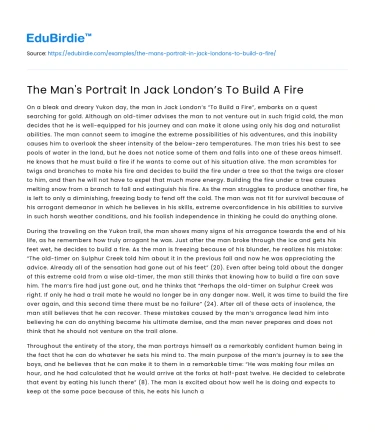On a bleak and dreary Yukon day, the man in Jack London’s “To Build a Fire”, embarks on a quest searching for gold. Although an old-timer advises the man to not venture out in such frigid cold, the man decides that he is well-equipped for his journey and can make it alone using only his dog and naturalist abilities. The man cannot seem to imagine the extreme possibilities of his adventures, and this inability causes him to overlook the sheer intensity of the below-zero temperatures. The man tries his best to see pools of water in the land, but he does not notice some of them and falls into one of these areas himself. He knows that he must build a fire if he wants to come out of his situation alive. The man scrambles for twigs and branches to make his fire and decides to build the fire under a tree so that the twigs are closer to him, and then he will not have to expel that much more energy. Building the fire under a tree causes melting snow from a branch to fall and extinguish his fire. As the man struggles to produce another fire, he is left to only a diminishing, freezing body to fend off the cold. The man was not fit for survival because of his arrogant demeanor in which he believes in his skills, extreme overconfidence in his abilities to survive in such harsh weather conditions, and his foolish independence in thinking he could do anything alone.
During the traveling on the Yukon trail, the man shows many signs of his arrogance towards the end of his life, as he remembers how truly arrogant he was. Just after the man broke through the ice and gets his feet wet, he decides to build a fire. As the man is freezing because of his blunder, he realizes his mistake: “The old-timer on Sulphur Creek told him about it in the previous fall and now he was appreciating the advice. Already all of the sensation had gone out of his feet” (20). Even after being told about the danger of this extreme cold from a wise old-timer, the man still thinks that knowing how to build a fire can save him. The man’s fire had just gone out, and he thinks that “Perhaps the old-timer on Sulphur Creek was right. If only he had a trail mate he would no longer be in any danger now. Well, it was time to build the fire over again, and this second time there must be no failure” (24). After all of these acts of insolence, the man still believes that he can recover. These mistakes caused by the man’s arrogance lead him into believing he can do anything became his ultimate demise, and the man never prepares and does not think that he should not venture on the trail alone.
Save your time!
We can take care of your essay
- Proper editing and formatting
- Free revision, title page, and bibliography
- Flexible prices and money-back guarantee
Throughout the entirety of the story, the man portrays himself as a remarkably confident human being in the fact that he can do whatever he sets his mind to. The main purpose of the man’s journey is to see the boys, and he believes that he can make it to them in a remarkable time: “He was making four miles an hour, and he had calculated that he would arrive at the forks at half-past twelve. He decided to celebrate that event by eating his lunch there” (8). The man is excited about how well he is doing and expects to keep at the same pace because of this, he eats his lunch as a preemptive celebration. Towards the end of the man’s adventure, after he gets his feet wet, he needs to make a fire to dry them off and believes he does so successfully: “he had had the accident; he was alone; and he had saved himself” (21). The man is convinced that time and time again if the same situation arises so will the same solution. In fact, the man is so confident that immediately after this he cannot look past his ego and his fire is extinguished, but the man is still optimistic and expects him to save himself alone.
The man displays certain qualities of independence because he is constantly thinking that he can find a solution to any problem alone. This is emphasized when he states that “He remembered the advice of the old-timer on Sulphur Creek, and smiled. The old-timer had been very serious in laying down the law that no man must travel alone in the Klondike after fifty below” (21). This quote suggests that the man found it almost comical that someone must travel with a partner in order to survive, as shown by him smiling after recalling the old-timer’s advice. Immediately after this, the man says, “Those old-timers were rather womanish, some of them, he thought. All a man had to do was keep his head, and he was all right. Any man who was a man could travel alone” (21). The man mocks the old-timers and completely distrusts their advice. The man is so recklessly independent that his belief in himself causes him harm. This portrays the man as a complete fool for his independence, as later in the story he even recalls their advice and wishes he had listened.






 Stuck on your essay?
Stuck on your essay?

